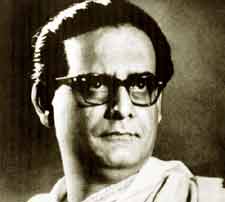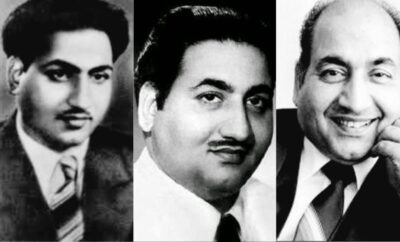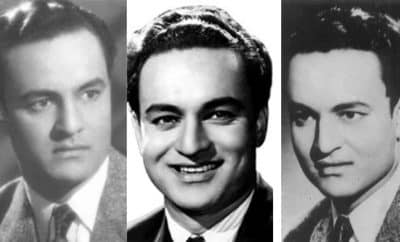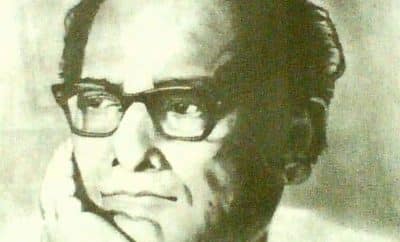Legends
Hemant Kumar – An Eternal Soul in the field of Music
There are some songs which are evergreen. And more timeless is the mind behind creating such songs. Such a mind was of Hemanta Kumar Mukhopadhayay also known as Hemanta Mukherjee. Hemanta Mukherjee was born on 16th June, 1920 in Varanasi. He contributed to the Hindi and Bengali film industry as a singer, composer and a producer.
Hemanat Mukherjee grew up in Kolkata. In his school days he used to write short stories and later he published a short story in a Bengali magazine called Desh. He decided to quit his studies and dedicate his life to music. Hemant Mukherjee used to sing in Bengali and non- Bengali songs under the name of Hemant Kumar.
Kumar’s first song was Amar Ganete Ele Nabarupi Chirantanii which he recorded for All India Radio in 1935. In 1937 he recorded his song for gramophone disc and thereafter he continued recording for Gramophone Company of India. He recorded his first Hindi songs Kitana Dukh Bhulaya Tumne and O Preet Nibhanewali for Gramophone Company of India under Columbia label in 1940. The music of these songs was composed by Kamal Dasgupta and lyrics were penned down by Faiyaz Hashmi.
With the Bengali film Nimai Sanyas in 1941, Kumar embarked his journey as a singer in the Bengali film industry. The music was scored by Hariprasanna Das. In 1944 he recorded his first Hindi song for the movie Irada for which Pt. Amarnath composed the music and Aziz Kashmiri gave the lyrics. In 1944 he recorded his first Rabindra Sangeet for a Bengali film Priya Bandhabi. In the same year he recorded his first non – film Rabindra sangeet under the Columbia label.
Abhiyatri in 1947 marked the beginning of Kumar as a music director. In the same year of 1947 Kumar recorded a non – film song Ganyer badhu (The rural bride), the music and lyrics were given by Salil Chowdhary. The song portrayed the caring and prosperous life of a rural woman and how it got destroyed because of famine and poverty. This was unconventional Bengali song which brought immense popularity to Kumar and Chowdhary. To mention, Kumar along with Chowdhary was an active member of Indian People’s Theatre Association which was established mainly because of Bengal famine in 1943. The duo worked together for many songs which became some popular songs in the film industry.
After this, Kumar started getting offers for composing music and with the call of the director Hemen Gupta, Kumar moved to Mumbai where he composed music for Gupta’s film Anand Math (1951) under the banner of Filmistan. The song Vande Mataram of this film sung by Lata Mangeshkar became the most popular song of the film. Afterwards he continued composing songs for films like Shart, etc. and balanced his career as a singer as well. He gave his voice for Dev Anand under S.D. Burman for a few movies.
Kumar was considered as the foremost advocate of Rabindra Sangeet. In 1980, in Kolkata, at a programme organised to honour Debabrata Biswas who was one of the legendary exponent of Rabindra Sangeet, he addressed Kumar as the ‘second hero’ to popularise Rabindra Sangeet, Pankaj Kumar Mallick being the first one. But not only in Rabindra Sangeet, Kumar earned a lot of fame as a music composer. In 1954, he composed music for the Hindi movie Nagin which won him the prestigious Filmfare Award for the best music director. In the same year he met the Bengali actor Uttam Kumar for the movie Shapmochan in which he scored the music for the film as well as played back for Uttam Kumar in two songs. The popular duo of the singer – actor worked together for several other movies.
By the late 1950s Kumar established himself as a great composer and a singer. He sang songs for notable Bengali music directors like Nachiketa Ghosh, Robin Chatterjee and Salil Chowdhury. As a composer, he composed music for hit movies like Harano Sur, Neel Akasher Neechey, Deep Jwele Jaai, etc. and Jagriti and Ek Hi Raasta in Hindi.
Kumar was a versatile personality who did not constrict himself to music but went on to produce movies as well. Neel Akasher Neechey (1959) directed by Mrinal Sen was the first film under the banner of Hemanta – Bela productions which later changed to Geetanjali productions. This particular movie won the President’s Gold Medal Award – the highest honour for the movie bestowed by Government of India. Under the banner of Geetanjali, Hindi movies like Bees Saal Baad, Kohraa, Khamoshi, etc were produced for which Kumar himself composed the music.
Kumar was a fantastic composer who believed in experimenting. In 1963 for the movie Palatak he fused Bengali folk music and light music and it became a great hit. Consequently he brought change in the style of his compositions for his future movies Bhagini and Balika Badhu. However popular he became as a music composer but Rabinbdra Sangeet was in his blood. He was the lead male voice for Tagore’s musical dramas and was part of the Rabindra Sangeet triumvirate along with Kanika Bandopadhyay and Suchitra Mitra.
A true legend, Kumar went on composing and singing till the last stage of his life. In 1971 he went to Hollywood to compose music for the movie Siddhartha directed by Conrad Rooks and also sang for the film. He became the first Indian singer to be honoured with USA citizenship. The journey still continued as he went on composing music for Bengali movies and sing some non – film songs. In 1989 he went to receive Michael Madhusudan Award at Dhaka in Bangladesh, also to perform at a concert there. After he returned, Kumar died of a heart attack on 26th September.
Kumar got married in 1945 to Bela and had two children; Jayant and Ranu. Ranu pursued her career in the field of music and Jayant got married to Moushmi Chatterjee, an Indian film actress. Kumar earned name also as a philanthropist. He ran a homeopathic hospital in the memory of his beloved father in his native village Baharu, in the south district of West Bengal. In his memory Gramophone Company of India at least one album by Kumar and he was also awarded for completing his fifty years in music field and also won won two national award for best male playback singer category.




